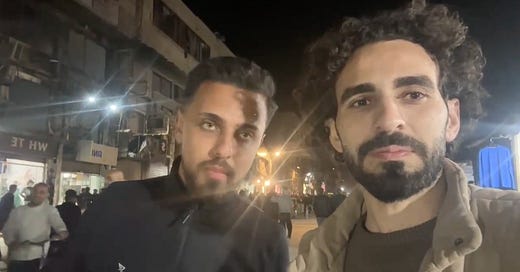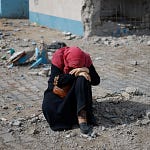While two billion Muslims around the world are busying celebrating Eid al-Fitr, which marks the end of the holy month of Ramadan, Palestinians in Gaza are suffering in a dire situation, where distant memories of joy feel almost imaginary amid Israel’s ongoing genocidal onslaught across the Strip.
Sobhi Naser, 28, used to spend the day before Eid hanging out with friends, enjoying the excitement of the upcoming holiday.
“We would go to local shops to buy new clothes, eat sweets like Knafeh, and then go to the barbershop to have our hair cut to be in the most elegant shape.”
“Our feelings were not like anything else. We would make it a special night, having fun and laughing,” he said. “Our life was simple and quiet; it was a paradise compared to our life now.”
Tragically, three of Sobhi’s five close friends were killed in Israeli attacks over the last year. His house and supermarket, located in the same building in Al-Tuffah neighbourhood, eastern Gaza City, were bombed in May 2024. He now lives in a tent in the same neighbourhood.
“Eid will never be the same for me after I lost the people who were a main part of it. How can I feel joy while my friends are dead?” he said.
Like many others, Sobhi used to visit his neighbours and relatives during the first day of Eid, but this time, he will go nowhere but to the graveyard to visit his lost loved ones.
“Most of my relatives’ houses, which I used to visit, are now destroyed by Israeli attacks, and they live in a dire situation in makeshift tents in the streets.
“My sister, Farah, fled two weeks ago from her house in Beit Hanoun, in the northern part of the Strip. She now resides in a room in her husband’s family’s house in central Gaza City. How can I visit her to exchange greetings and gifts in anticipation of the celebrations while she has no space or privacy for herself?”
Sobhi works with his brother Salam in a stall selling children’s clothes in Omar Al-Mukhtar market, central Gaza City. They sell clothes at affordable prices, aiming to encourage people to buy new clothes and share the joy among the children.
“We don’t want a good return. We want to help people get new clothes and feel the joy of our stolen Eid.”
Despite the disappointing atmosphere in Gaza as Eid comes for the second time during the ongoing genocide, many people do their best to live the traditions of Eid and enjoy themselves and the people around them with whatever little they have.
Rakan Abo Saif, 27, comes for the third day in a row with his brother to the Al-Rimal neighbourhood. They want to buy new clothes, but the border closure has left very few options available in the markets, as many stores and shops were also destroyed during the war.
“We used to hesitate when choosing which clothes we wanted to buy before the war, but now, the shops are empty of goods, and we can hardly find anything to buy,” he said.
“I anticipated that Eid would come during a ceasefire so we could live it in peace, but we are celebrating it again while we could be killed at any moment.”
Since the early morning of the first day of Eid al-Fitr in Gaza, at least 65 people have been killed across the Gaza Strip, including children and women who were wearing their new clothes for Eid.
Despite the risk of movement, Rakan will visit his only sister, who is displaced in a makeshift tent in the Al-Wehda neighborhood, central Gaza City.
“We can never normalise the war, but we have no choice but to carry on with our lives and resist by living as we want,” he said.
Rakan was once a talented sweet chef in several restaurants and cafes in Gaza. He used to be busy during these times, making treats like baklava, crepes, and other desserts, but now that he has run out of electricity and ingredients in Gaza, most of the resources he used to collaborate with are closed.
“Even if people want to make desserts in their homes or tents with the available ingredients, it would not be affordable for most of them due to the expensive prices in Gaza,” he said.
“I wish Eid would come during a ceasefire while we are relieved and living in peace.”
Tamador Al-Shorfa, 50, would make ka’ak, ring-shaped traditional biscuits, in her house in Al-Shujaiya neighborhood, eastern Gaza City, to distribute to her relatives and offer to visitors, but this time, she couldn’t make them.
“We could hardly find a few canned foods to survive. We can’t afford to buy sugar, flour, eggs, or cooking gas to make ka’ak,” Tamador said.
“Our Eid is sad while we are living with hunger, fear, loss, and bombing.”
Tamador lost two of her brothers in Israeli airstrikes in November 2024. They were killed while fetching water in their neighborhood in Jabalia camp, in the northern Strip.
“I cleaned my house, and I prepared the coffee as I used to before Eid, but none of my relatives are left to visit me.”
Ahmed Dremly is a Palestinian journalist based in Gaza City.














Share this post